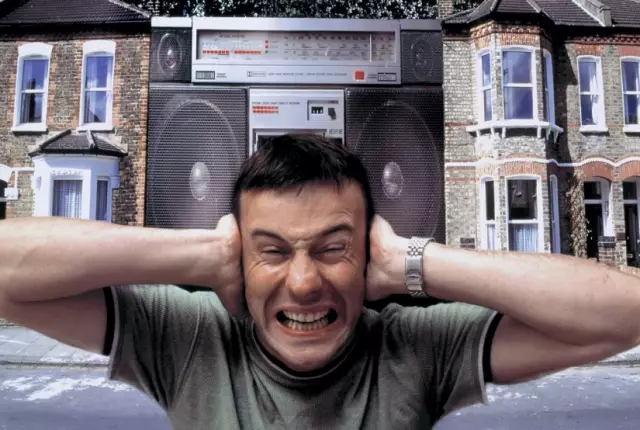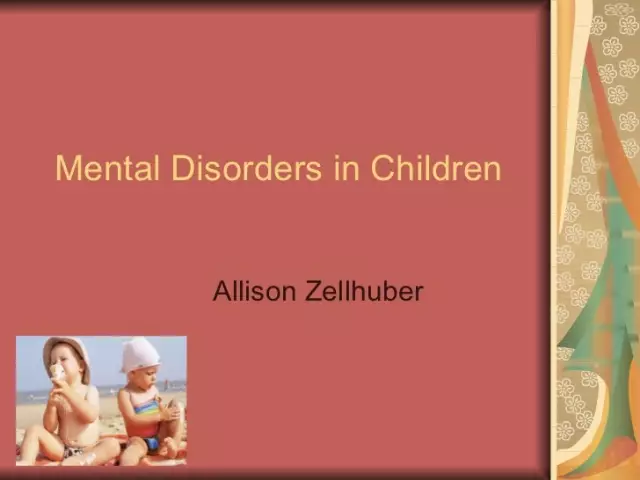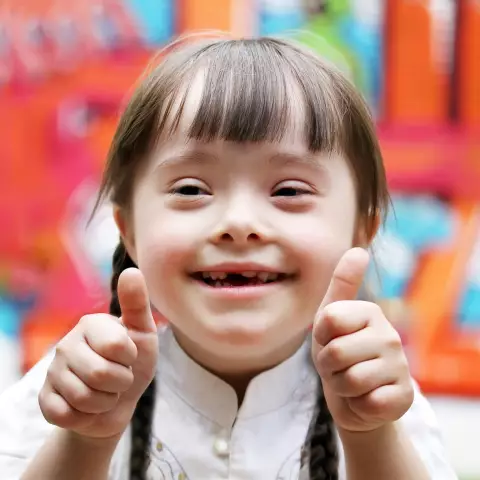- Author Rachel Wainwright wainwright@abchealthonline.com.
- Public 2023-12-15 07:39.
- Last modified 2025-11-02 20:14.
Children with mental disorders and disabilities

It is believed that deviations in the mental development of a child cannot be distinguished at an early age, and any inappropriate behavior is considered as a child's whim. However, today, specialists can notice many mental disorders already in a newborn, which allows treatment to begin on time.
Neuropsychological signs of mental disorders in children
Doctors have identified a number of syndromes - mental characteristics of children, most often found at different ages. The syndrome of functional deficiency of subcortical formations of the brain develops in the prenatal period. It is characterized by:
- Emotional instability, expressed in frequent mood swings;
- Increased fatigue and associated low working capacity;
- Pathological stubbornness and laziness;
- Sensitivity, moodiness and uncontrollability in behavior;
- Prolonged enuresis (often up to 10-12 years);
- Underdevelopment of fine motor skills;
- Manifestations of psoriasis or allergies;
- Appetite and sleep disorders;
- Delayed formation of graphic activity (drawing, handwriting);
- Tiki, grimacing, screaming, uncontrollable laughter.
The syndrome is quite difficult to correct, because due to the fact that the frontal regions are not formed, most often deviations in the mental development of the child are accompanied by intellectual disability.
Dysgenetic syndrome associated with functional deficiency of brain stem formations can manifest itself in childhood up to 1.5 years. Its main features are:
- Disharmonious mental development with a shift in stages;
- Facial asymmetries, abnormal growth of teeth and violation of body formula;
- Difficulty falling asleep
- Abundance of age spots and moles;
- Distortion of motor development;
- Diathesis, allergies and disorders in the endocrine system;
- Problems in developing neatness skills;
- Encopresis or enuresis
- Distorted threshold of pain sensitivity;
- Violations of phonemic analysis, school maladjustment;
- Memory selectivity.
The mental characteristics of children with this syndrome are difficult to correct. Educators and parents should ensure the neurological health of the child and the development of his vestibular-motor coordination. It should also be borne in mind that emotional disorders intensify against the background of fatigue and exhaustion.
The syndrome associated with the functional imperfection of the right hemisphere of the brain can manifest itself from 1.5 to 7-8 years. Deviations in the mental development of the child are manifested as:
- Mosaic perception;
- Impaired differentiation of emotions;
- Confabulations (fantasy, fiction);
- Color discrimination disorders;
- Errors in estimating angles, distances and proportions;
- Distorted memories;
- Feeling of multiplicity of limbs;
- Disturbances in staging stress.
To correct the syndrome and reduce the severity of mental disorders in children, it is necessary to ensure the neurological health of the child and pay special attention to the development of visual-figurative and visual-effective thinking, spatial representation, visual perception and memory.
A number of syndromes are also distinguished that develop from 7 to 15 years due to:
- Birth injury to the cervical spinal cord;
- General anesthesia;
- Concussion;
- Emotional stress;
- Intracranial pressure.
To correct deviations in the mental development of a child, a set of measures is needed to develop interhemispheric interaction and ensure the neurological health of the child.
Mental characteristics of children of different ages
The most important thing in the development of a small child under 3 years old is communication with the mother. It is the lack of maternal attention, love and communication that many doctors consider the basis for the development of various mental disorders. Doctors call the second reason a genetic predisposition passed on to children from parents.
The period of early childhood is called somatic, when the development of mental functions is directly related to movements. The most typical manifestations of mental disorders in children include indigestion and sleep disorders, flinching at harsh sounds, and monotonous crying. Therefore, if the baby is anxious for a long time, it is necessary to consult a doctor who will help either diagnose the problem, or allay the fears of the parents.
Children aged 3-6 years develop quite actively. Psychologists characterize this period as psychomotor, when the reaction to stress can manifest itself in the form of stuttering, tics, nightmares, neurotization, irritability, affective disorders and fears. As a rule, this period is quite stressful, because usually at this time the child begins to attend preschool educational institutions.
The ease of adaptation in a children's team largely depends on psychological, social and intellectual training. Mental abnormalities in children of this age can occur due to increased loads for which they are not prepared. It is quite difficult for hyperactive children to get used to the new rules that require perseverance and concentration.
At the age of 7-12, mental disorders in children can manifest as depressive disorders. Quite often, for self-affirmation, children choose friends with similar problems and ways of expressing themselves. But even more often in our time, children replace real communication with virtual ones on social networks. The impunity and anonymity of such communication contributes to further alienation, and existing disorders can progress rapidly. In addition, prolonged concentration in front of the screen affects the brain and can cause epileptic seizures.
Abnormalities in the mental development of a child at this age, in the absence of a reaction from adults, can lead to rather serious consequences, including sexual development disorders and suicide. It is also important to monitor the behavior of girls, who often begin to be dissatisfied with their appearance during this period. In this case, anorexia nervosa may develop, which is a severe psychosomatic disorder that can irreversibly disrupt metabolic processes in the body.

Also, doctors note that at this time mental abnormalities in children can develop into a manifest period of schizophrenia. If you do not respond in time, pathological fantasies and overvalued hobbies can develop into delusional ideas with hallucinations, changes in thinking and behavior.
Deviations in the mental development of a child can manifest themselves in different ways. In some cases, the parents' fears for their joy are not confirmed, and sometimes the help of a doctor is really needed. Treatment of mental disorders can and should be carried out only by a specialist who has sufficient experience to make the correct diagnosis, and success largely depends not only on the right medicines, but also on family support.
YouTube video related to the article:
Found a mistake in the text? Select it and press Ctrl + Enter.






